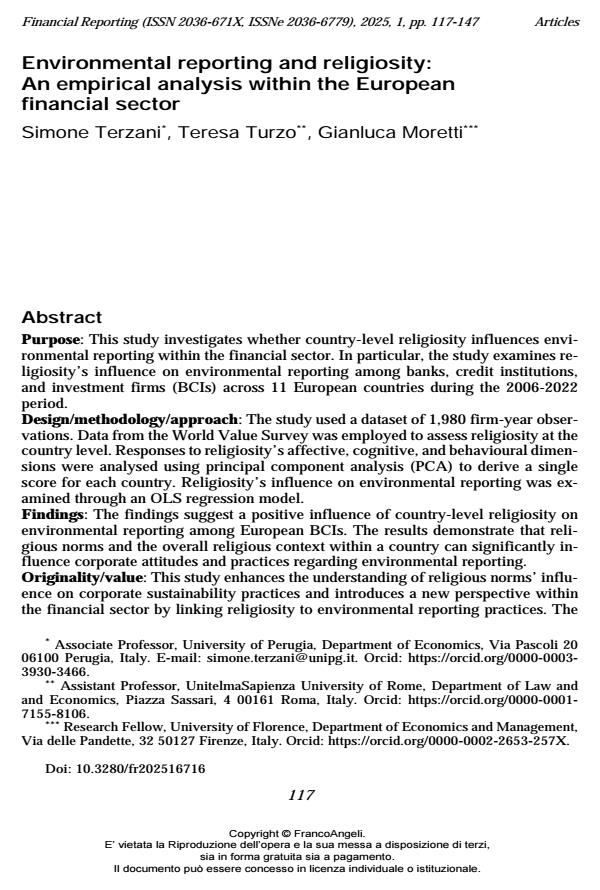Environmental reporting and religiosity: An empirical analysis within the European financial sector
Journal title FINANCIAL REPORTING
Author/s Simone Terzani, Teresa Turzo, Gianluca Moretti
Publishing Year 2025 Issue 2025/1
Language English Pages 31 P. 117-147 File size 192 KB
DOI 10.3280/fr202516716
DOI is like a bar code for intellectual property: to have more infomation
click here
Below, you can see the article first page
If you want to buy this article in PDF format, you can do it, following the instructions to buy download credits

FrancoAngeli is member of Publishers International Linking Association, Inc (PILA), a not-for-profit association which run the CrossRef service enabling links to and from online scholarly content.
Purpose: This study investigates whether country-level religiosity influences environmental reporting within the financial sector. In particular, the study examines religiosity’s influence on environmental reporting among banks, credit institutions, and investment firms (BCIs) across 11 European countries during the 2006-2022 period. Design/methodology/approach: The study used a dataset of 1,980 firm-year observations. Data from the World Value Survey was employed to assess religiosity at the country level. Responses to religiosity’s affective, cognitive, and behavioural dimensions were analysed using principal component analysis (PCA) to derive a single score for each country. Religiosity’s influence on environmental reporting was examined through an OLS regression model. Findings: The findings suggest a positive influence of country-level religiosity on environmental reporting among European BCIs. The results demonstrate that religious norms and the overall religious context within a country can significantly influence corporate attitudes and practices regarding environmental reporting. Originality/value: This study enhances the understanding of religious norms’ influence on corporate sustainability practices and introduces a new perspective within the financial sector by linking religiosity to environmental reporting practices. The findings align with theoretical frameworks of institutional and social norms theories, opening avenues for further research that could examine religiosity’s influence on corporate sustainability. Moreover, it addresses the topic within the European context, reflecting recent developments’ effects on nonfinancial reporting regulation and a certain degree of religious diversity, which may lead to different interpretations and expectations concerning environmental issues and reporting
Keywords: environmental reporting, religiosity, financial sector, religious social norms, institutional theory, social norms theory
Jel codes: G20, M14, M41, Q56, Z12
Simone Terzani, Teresa Turzo, Gianluca Moretti, Environmental reporting and religiosity: An empirical analysis within the European financial sector in "FINANCIAL REPORTING" 1/2025, pp 117-147, DOI: 10.3280/fr202516716